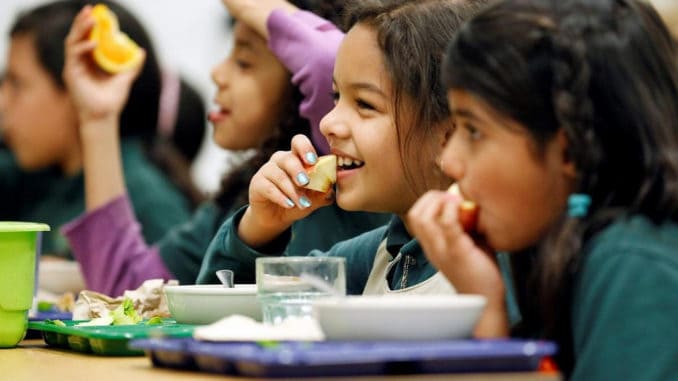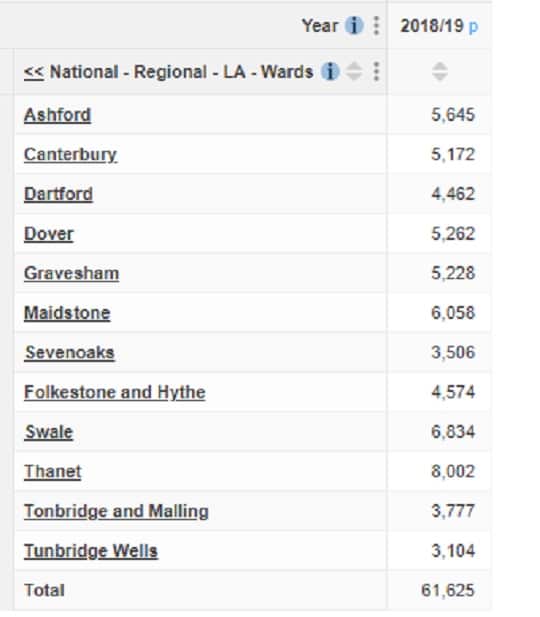
By Local Democracy Reporter Ciaran Duggan and Kathy Bailes
Kent’s poorest children could be “deprived” of free school meals if their parents are made redundant during the summer holidays, a councillor has warned.
A £120million Covid summer food fund has been set up by Boris Johnson’s government for disadvantaged school children, aged five to 16, which will run for six weeks from July 20 to the end of August.
However, the £90 food voucher will have to be ordered by parents seven days before the school term ends. This means that claims will not be accepted after mid-July.
Kent County Council’s (KCC) main opposition leader Rob Bird (Lib Dem) warned that the “cut-off point” could be damaging for Kent families that suffer job losses over the two-month summer recess.

The county councillor said: “There will be people who will be become unemployed in that six weeks. I wonder if we can think about some sort of scheme within KCC for picking up those children who may be deprived of free school meals due to circumstances beyond their control.”
The £330billion UK Government furlough scheme started three months ago and is due to end on October 31. But, thousands of people across the country have already lost their jobs in the hospitality, airline and tourist sectors as lockdown restrictions have been eased.
Unemployment in Kent and Medway has risen by 122% since March, including 650 Covid-related job losses at Danish ferry operator, DFDS, which runs through Dover.
KCC’s corporate director for education, Matt Dunkley, said County Hall continues to support families through financial hardship during the pandemic.
During a KCC scrutiny committee meeting yesterday (July 7), Mr Dunkley said many parents were being directed to support bases, such as food banks.
He added: “It’s not a complete safety net, but staff from KCC’s social care and early help departments are making sure that food security is focused on.”
KCC’s scrutiny committee was also told that there had been an increase in the uptake of students applying for free school meal vouchers, rising from 17% of Kent’s 230,000 primary and secondary pupils in March to around 22%.
In June, Department for Education chiefs said that the scheme would be extended throughout the summer holidays and 1.3million children in England would be eligible. This came following a high-profile campaign by Manchester United striker Marcus Rashford.
Under the free meal scheme, families are issued with either an electronic voucher or gift card worth £15 each week per pupil, to spend at shops including Sainsbury’s, Asda, Tesco, Morrisons, Waitrose and M&S.
Below the breadline
Thanet has the highest rates of child poverty in Kent – with almost a quarter of the isle’s youngsters deemed to be living below the breadline.
The data for 2018/19, compiled by Loughborough University on behalf of coalition End Child Poverty, says the figure stands at 24.7% – a hike of 4% since 2014 and 1% higher than last year. However, these figures are based on family income before housing costs. Last year there was also a breakdown of how families were impacted after housing costs – showing Thanet as having 35% of 16-year-olds and under living in poverty – but changes to the way data has been collected means no comparable figure has been published this year.

Data for those in poverty before housing costs shows more than 8,000 youngsters are living in families whose income is 60% below the median income – the indicator used for living in relative poverty.
Figures from the Department for Work and Pensions for children in ‘relative poverty’ households* shows Cliftonville West is the most affected area with more than double the number of struggling families with children compared to other wards, with 1,152 recorded. The next highest number is in Dane valley at 833 and then Ramsgate’s Eastcliff at 586.
The End Child Poverty coalition is calling on the Government to take seriously how the steady four-year rise in child poverty – predominantly in working families – has pushed people to breaking point. They want ministers to commit to an ambitious strategy to end child poverty in the aftermath of Coronavirus. which campaigners fear will only have deepened the problem and drawn more families below the poverty line.
Unemployment
The isle also has the highest benefit claimant rate in Kent – and the highest in the south east for those aged between 18 and 24.
Data from Kent County Council shows the rate of unemployment claimants in Thanet in April had rocketed by 56.5% and now stands at its highest since September 1996 – as does the rate for the entire county.
The number of 18 to 24-year-olds not in employment in Thanet stands at a shocking 13.6% – 1415 people -the highest in the south east. This is in stark comparison to Canterbury which records the lowest number of 18 to 24-year-old claimants at 3.6%.

At ward level Margate Central is hardest hit with 17.5% of its population claiming jobseekers or UC – a rise of 200 people from March. In Cliftonville West the rate is 15% and in Dane Valley it stands at 12%.
A new job creation scheme for young people was announced by Chancellor Rishi Sunak today (July 8) with the Kickstart Scheme pledging to pay employers who create jobs for 16-24 year-olds.

